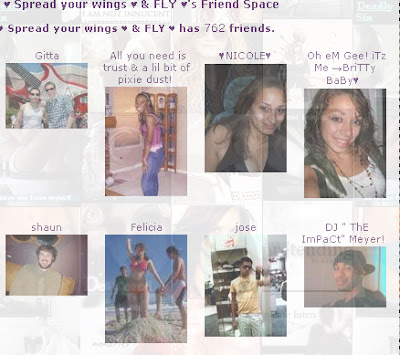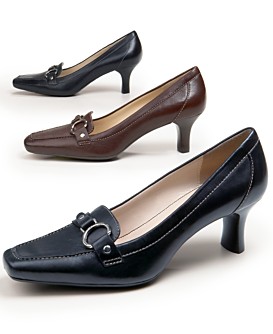Identity plays a key role in virtual communities. In communication, which is the primary activity, knowing the identity of those with whom you communicate is essential for understanding and evaluating an interaction. Yet in the disembodied world of the virtual community, identity is also ambiguous. Many of the basic cues about personality and social role we are accustomed to in the physical world are absent (Donath, Identity and Deception in the Virtual Community).
As I will explain later, in the case of myspace, identity on the web and in online communities can be deceptive, and one must be careful when partaking in a community online.
Now lets talk about myspace. A wise man once said, "So you want to get to know me? Why don't you start off my checking out my myspace." This is because myspace is a great place to share information about yourself to anybody interested, and I mean anybody. Here I am, you can tell its me because theres a picture of me.

You can also tell its me, because it says my name and where I am from. But thats pretty much all the information I want to give out. If I wanted to, I could chose to tell you my life story and my social security number, but I frankly don't feel safe doing that. The reason being, because anybody who has an email address can sign up for myspace and can then see the information I put up. And who knows why they want to see my information or what they are going to do with it. I am not willing to take that chance. So my friends signed me up to myspace, before the era of facebook. Through myspace I was able to keep contact with friends I did not see very often, people who lived far away from me. Like my friend Melissa, I could now keep in contact with her pretty easy, check out her picture and interests.

So I was enjoying my time on myspace, talking to my friends and such.
But then I had a realization that myspace is a community. People have friends... myspace friends. Not friends they go to school with or hangout with, people that they met on myspace and have never met in person. And I started thinking, are these people really who they saw they are? I mean how valid is a myspace profile, and how do you prove its validity? You can't. You have to trust that people are who they say they are. It is like meeting a person for the first time. You don't really know them, but you trust that they are not lying to you and they are who they say they are. But there are some people on myspace that probably are lying about their identity. For example, these guys


So myspace is a place where you can create an identity, a new identity. Its a chance to redefine yourself. And you can gain a reputation simply. Step one: make your profile picture make you seen cool and rebellions.

Next, make a profile that makes you sounds adventurous and wild.

And then finally start finding friends.

So you've successfully created a false identity, even though you may not realize it. Unless you are truthful in everything you say, the identity you made on myspace is not real. Maybe its the person you want to be, or the person you want others to think you are. And you gain a reputation by having the most friends or writing on other people's wall. You could customize your profile to your liking. You can edit your interests like favorite music or movies. People might know you as the person with the cool pictures or you can get yourself out there and write blog or journal entries. You can really do whatever you want and you will probably get recognition for it, sometimes good and sometimes bad recognition. This recognition turns into a reputation.
But there are also cases of identity theft on myspace. Who says I can't take a picture, off of your myspace for example, and make a profile out of that. And when I make a profile, I essentially make an identity. Or what about a celebrity, why can't I be a professional athlete. A name and a picture is all I need, and I can make up the rest. With a name and a picture, I can be anybody I want to be. From there, who knows what you can do. I can post a picture of a teenager, and really be a 50 year old sexual offender. I can create a profile of your girlfriend and tell you I want to brake up with you. I can take your name, picture, address, and sell that information to credit card or phone companies to solicit information to you. I can read your interests and sell your information to companies that sell products that you are interested in. There is a vast amount of identity theft and fraud that can be done via myspace. But I am not saying myspace is bad, and I am definitely saying it is good. But what I am saying is that it could be bad if you are not smart about it. If you put out personal information, assume that it will be taken. If you don't want people to see certain things or know things about you, do not put it out there for people to see.
And just so you all know, I asked and got confirmation that it was okay to use these people's myspaces and pictures in this blog. So thanks to Melissa, Skankin Richard, White Trash Wayne, Elliot, Jenn, and Ednalyn. And one last note, identity thieves, please do not steal information off my myspace page please!
Citations:
1. Masum, Hassan and Zhang, Yi-Cheng. (2004, July).Manifesto for the Reputation Society. volume 9, number 7. retrieved 21 February 2007. http://firstmonday.org/issues/issue9_7/masum/index.html.
2. Lackaff, D. (2003). Norm maintenance in online communities: A review of moderation regimes Unpublished master's (preliminary) thesis, La Trobe University, Bundoora, Victoria, Australia.
3. Donath, Judith S. Identity and Deception in the Virtual Community. (12 November 1996). retrieved 21 February 2007. http://smg.media.mit.edu/people/Judith/Identity/IdentityDeception.html.



